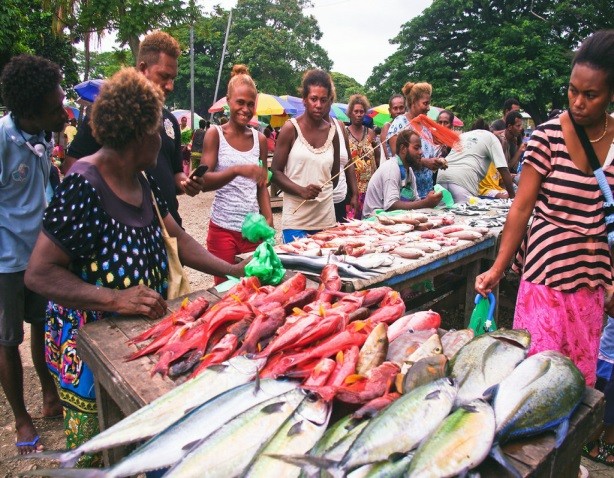
Dec. 2014—Technology is catching on in the Solomon Islands’ fishing industry. Just ask the women and men who each day take stock of fish arriving by canoes and boats at local markets. They will tell you that tracking the size of the catch, species and price for this Pacific island nation’s fish is now much easier with mobile phones.
Using the USAID-funded Hapi Fis, Hapi Pipol! (Happy Fish, Happy People!) mobile application, fishing communities and vendors are feeding a real-time database to help manage their fisheries. Not only is the app helping to reel in the data, but it also netted a grand prize in USAID’s Science and Technology Pioneers Prize contest, which recognizes the best projects and activities that apply science and technology to address development challenges.
Without precise market data, fisheries management had previously proved difficult in a country spread out over 1,000 islands. Paper entries at times became wet and illegible and data was not entered into a consolidated database to support decisions.
Surveyors use the app to collect data on inshore fisheries and then transmit the findings to an online server where it is analyzed. Government officials can then compile information from fishers and fish vendors about catch volume, size and prices at the nation’s major fish markets and landing stations, and share the information with the fishing industry to help protect the country’s fisheries.
“The USAID-funded application is a great help to the ministry and to the people of Solomon Islands,” said Christian Ramofafia, permanent secretary at the Ministry of Fisheries and Marine Resources. “It helps staff understand the linkage between the information collected and the decisions that are made in the ministry in terms of how to manage the fisheries. The key thing for the ministry to relate to the fishers is the sustainability of their resources for their children now and into the future.”
The surveyors can learn to use the app in half a day, and are finding it efficient and convenient. “The app is excellent. It is very handy,” said one surveyor, Sunita Pikacha. “The questions are simple and the vendors can answer all of them.”
The app is also a model in the use of technology for development. “This mobile app is a great example of how we can use technology to improve development outcomes, in this case, to improve fisheries management and food security,” said Michael Yates, director of USAID’s Regional Development Mission for Asia. “It also engages local citizens in the data collection process, and that’s important to build stakeholder commitment and support.”
The Hapi Fis program, part of U.S. support to the six-nation Coral Triangle Initiative on Coral Reefs, Fisheries and Food Security, started in late 2012 when the Ministry of Fisheries and Marine Resources asked whether mobile phone data gathering applications could be adapted for inshore fisheries.
According to Solomon Island Government Chief Fisheries Officer Ben Buga, the ministry needed data about the volume of fish, origin, size, species and the type of fishing method for resource management purposes. “With this Hapi Fis market survey program, we now have the data that we need at our fingertips,” he said.
The program, based on open software and available for other countries to adapt, now has a database with thousands of surveys for markets around the capital Honiara. With USAID support, the ministry tested the app for use in the Western province, where it will soon be launched with additional support from the New Zealand Aid Programme. Other provinces, eagerly waiting their turn to move from paper to smartphone, do not want to miss the boat.
LINKS
Follow @USAIDAsia, on Facebook, on Flickr, on YouTube







Comment
Make a general inquiry or suggest an improvement.